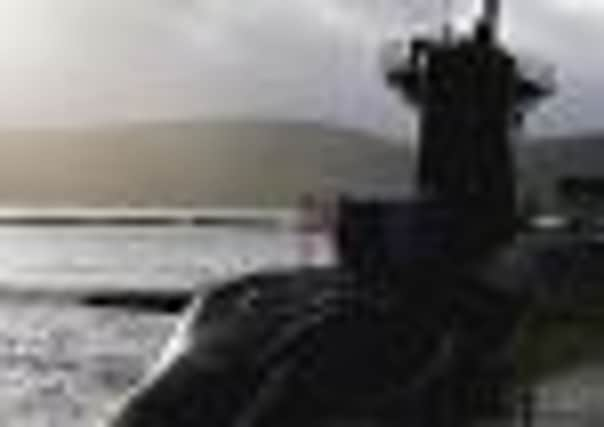Leaders: Constitutional questions go beyond Nato membership


The party’s leadership would like to see Scotland remain within Nato – but on the clear understanding that her insistence on no nuclear weapons on Scottish soil is respected.
Mr Salmond said an SNP government would bring forward a white paper on independence which proposes a written constitution for an independent Scotland, and that constitution will have to be ratified by the Scottish Parliament elected in 2016.
Advertisement
Hide AdAdvertisement
Hide AdThe notion that opposition to Trident would thus be enshrined in such a constitution if Scotland votes ‘yes’ to independence in 2014 has initially been given a guarded and qualified welcome by anti-nuclear lobby groups. However, it cannot of course guarantee that such a constitution would be ratified in a popular vote, any more than it can guarantee a ‘yes’ vote in 2014.
It is thus by no means clear that he has gone far enough to prevent a division from opening up within the party.
The objection remains that such a compromise – Scotland remaining within the Nato nuclear umbrella but standing outside the nuclear shield – is unacceptable to the party’s anti-nuclear wing. Until now, the SNP has had a longstanding total opposition to membership of Nato in any form. This halfway house is thus open to charges that it is hypocritical.
Mr Salmond points to other examples where smaller nations have agreed to Nato membership on this basis. But this is a proposed opt-out from what is still one of the world’s strongest nuclear powers and could hardly guarantee its citizens protection were a nuclear attack to be made on the rest of the UK.
As the Green MSP Patrick Harvie points out, the implication is that Scotland would rely on other countries to deploy nuclear weapons on our behalf while removing Trident from the Clyde. The No To Nato Scotland Coalition, while welcoming the proposals, has called on the SNP leadership to reject membership of the military alliance.
What will also excite attention is the precedent such a proposal would establish for other positions in a written constitution. It may unleash a torrent of lobbying and sectional demands from a wide range of perspectives for all manner of guarantees and entitlements to be similarly enshrined: the electoral system and political arrangements post- independence vote; economic policy; citizen definition; legal protection and the enshrinement of health, education and welfare entitlements, as well as defence.
Such a constitution will also need to be compatible with EU requirements relating to our continued membership. Membership of Nato will be just one of many fundamental issues still to be resolved in a further vote.
Support SMEs to expand and employ
IT SEEMS Scottish Conservative leader Ruth Davidson won’t be upstaged by her Labour counterpart Johann Lamont in the field of tough “truths”. In her speech today, at the Conservative Party conference, she is due to say that something like 88 per cent of Scots contribute less than they get from the state – that is, only 12 per cent are net contributors.
Advertisement
Hide AdAdvertisement
Hide AdIt sounds a horrific statistic. But after making allowance for under-18s, pensioners – the vast majority of whom have given a great deal to the state across their working lifetimes – and part-time workers, it is not so horrific – or indeed meaningful. It is true that demographic change evident across many Western economies, not Scotland alone, presents a shrinking working-age population with a formidable challenge.
Her general thrust is correct: the welfare budget cannot sustain current demands; we do need to see many more working-age adults in work; and benefits have to be earned by contributions from a productive workforce. Today’s Bank of Scotland PMI report of a slowdown in private sector activity in Scotland last month speaks to a daunting background.
But there is much that targeted support can achieve – skills training and encouraging companies to invest, expand and take on staff. Here, the lighter the tax and regulatory burden, the greater the prospects for growth. This is particularly the case in the small and medium-sized enterprise (SME) sector, which accounts for more than half of Scotland’s private sector workforce.
We need to give greater support to enterprise and business formation. A crusade to Start-Up Scotland would do much to encourage Scots to develop talent and initiative – and drive the economy back to growth.